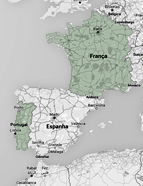

The affinities of the founding members were not only a result of the effervescent post-war political context, additionally they all held degrees in different areas of the social sciences in the early 1940s, and four of them had been students of Magalhães Godinho at the FLUL. At the time, their professional careers were unstable or marginal to their ambitions of pursuing an academic career: some were engaged in other research and teaching activities, others were high school teachers or made a living from publishing articles, translations and other activities linked to the rare publishing initiatives in their social circles. Moreover, financial concerns often emerged in the correspondence of some of these founding members. They had been excluded, or had excluded themselves, from state research and higher education institutions. On the other hand, the universities of the 1940s had seen residual growth in the number of students, professors and budgets, which made it difficult for recent graduates to pursue a university career, and promoted clientele and mandarin practices in the rare calls for tender.
Against this backdrop, news of the creation of the SPHC was greeted with enthusiasm and hope, as was the possible fall of the regime within the political sphere. In his project presentation letter, Magalhães Godinho enticed his recipients by forwarding books and journals from France, with the possibility of publishing their work and scholarships to study in Paris. This enthusiasm is also evident in the work proposals suggested for discussion. For example, in April 1948, Fernando Pinto Loureiro proposed setting up a team to write a short history of Portugal; in the same month, Armando Castro expressed an interest in conducting a joint study with other members on some of the problems in the history of the Portuguese economy that occupied him at the time - the formation of the salaried class and the "transition from a feudal to a capitalist economy", among other topics; Borges de Macedo, at the 1st General Assembly of the SPHC, also held that month, reported on a project to study the period of fontismo, although he considered it premature as there were far more urgent organisational tasks to consider: attracting new members or patrons; the publication of a bulletin; the venue for meetings; legalization of the society; etc.
Despite these proposals, there appears not to have been a structured research plan beyond the guidelines laid down in Article 1 of the statutes sent to the Civil Government: "The purpose of the Portuguese Society for the History of Civilization is to cultivate and promote the study of economic, social, technical and cultural history and, in general, of all civilization, as well as the study of human geography, demography, economics, sociology, social and collective psychology, linguistics, etc. insofar as these sciences contribute to clarifying man's past and better defining the human condition."
